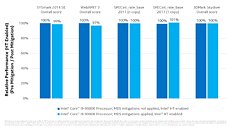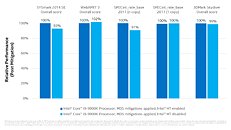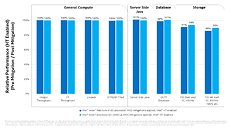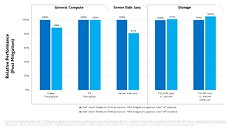Wednesday, May 15th 2019

Intel Puts Out Benchmarks Showing Minimal Performance Impact of MDS Mitigation
Intel Tuesday once again shook the IT world by disclosing severe microarchitecture-level security vulnerabilities affecting its processors. The Microarchitectural Data Sampling (MDS) class of vulnerabilities affect Intel CPU architectures older than "Coffee Lake" to a greater extent. Among other forms of mitigation software patches, Intel is recommending that users disable HyperThreading technology (HTT), Intel's simultaneous multithreading (SMT) implementation. This would significantly deplete multi-threaded performance on older processors with lower core-counts, particularly Core i3 2-core/4-thread chips.
On "safer" microarchitectures such as "Coffee Lake," though, Intel is expecting a minimal impact of software patches, and doesn't see any negative impact of disabling HTT. This may have something to do with the 50-100 percent increased core-counts with the 8th and 9th generations. The company put out a selection of benchmarks relevant to client and enterprise (data-center) use-cases. On the client use-case that's we're more interested in, a Core i9-9900K machine with software mitigation and HTT disabled is negligibly slower (within 2 percent) of a machine without mitigation and HTT enabled. Intel's selection of benchmarks include SYSMark 2014 SE, WebXprt 3, SPECInt rate base (1 copy and n copies), and 3DMark "Skydiver" with the chip's integrated UHD 630 graphics. Comparing machines with mitigations applied but toggling HTT presents a slightly different story.In the second graph (above), you'll see a comparison between two machines, both of which have the MDS mitigations, but one machine has HTT enabled, and the other has HTT disabled. The selection of tests is the same as the first graph. Here, you'll see performance either drop by 8 percent on SYSmark 2014 SE, and by 9 percent on SPECInt rate base (n copy), to practically no difference in 3DMark "Skydiver." and a negligible 2 percent gain with WebXprt 3 (less parallelized tests tend to benefit from HTT being disabled). Intel put out a similarly extensive selection of Data Center-relevant tests showing negligible performance impact with its MDS mitigation and recommended HTT setting on Xeon enterprise processors released after 2017.
Source:
Intel
On "safer" microarchitectures such as "Coffee Lake," though, Intel is expecting a minimal impact of software patches, and doesn't see any negative impact of disabling HTT. This may have something to do with the 50-100 percent increased core-counts with the 8th and 9th generations. The company put out a selection of benchmarks relevant to client and enterprise (data-center) use-cases. On the client use-case that's we're more interested in, a Core i9-9900K machine with software mitigation and HTT disabled is negligibly slower (within 2 percent) of a machine without mitigation and HTT enabled. Intel's selection of benchmarks include SYSMark 2014 SE, WebXprt 3, SPECInt rate base (1 copy and n copies), and 3DMark "Skydiver" with the chip's integrated UHD 630 graphics. Comparing machines with mitigations applied but toggling HTT presents a slightly different story.In the second graph (above), you'll see a comparison between two machines, both of which have the MDS mitigations, but one machine has HTT enabled, and the other has HTT disabled. The selection of tests is the same as the first graph. Here, you'll see performance either drop by 8 percent on SYSmark 2014 SE, and by 9 percent on SPECInt rate base (n copy), to practically no difference in 3DMark "Skydiver." and a negligible 2 percent gain with WebXprt 3 (less parallelized tests tend to benefit from HTT being disabled). Intel put out a similarly extensive selection of Data Center-relevant tests showing negligible performance impact with its MDS mitigation and recommended HTT setting on Xeon enterprise processors released after 2017.




31 Comments on Intel Puts Out Benchmarks Showing Minimal Performance Impact of MDS Mitigation
By themselves, each security issue fix isn't that impactful but once all of them are added up, they make quite a dent.
Makes me wonder if one of the reasons AMD was behind was because they are more cautious with security.
What's the point of HT if it only gains 2% yet costs so much in security term's.
It may be less on Windows, sometimes it's the same.
Linux usually is a good representation of potential theoretical performance for cpu and drives.
Gpu not so much yet but we're getting there
But yes! It absolutely does add up, gaming performance is adding up to 4% only at this point but usually 2-3..
Stil I think its all noteworthy.
I am not defending Intel as it does look like they have cut some corners with their security. But gamers wont notice a 1% difference in fps. That only shows up in a benchmark. m
I won't be surprised if we see a double whammy, aka, 3700x was going to win and beat out 9900k even at 1080p, but now we can slap on an extra 7% on top of that because of all these firmware updates.
just disable hyperthreading guys, the selling point of our upper-end processors, no big deal!
lmao, classic intel